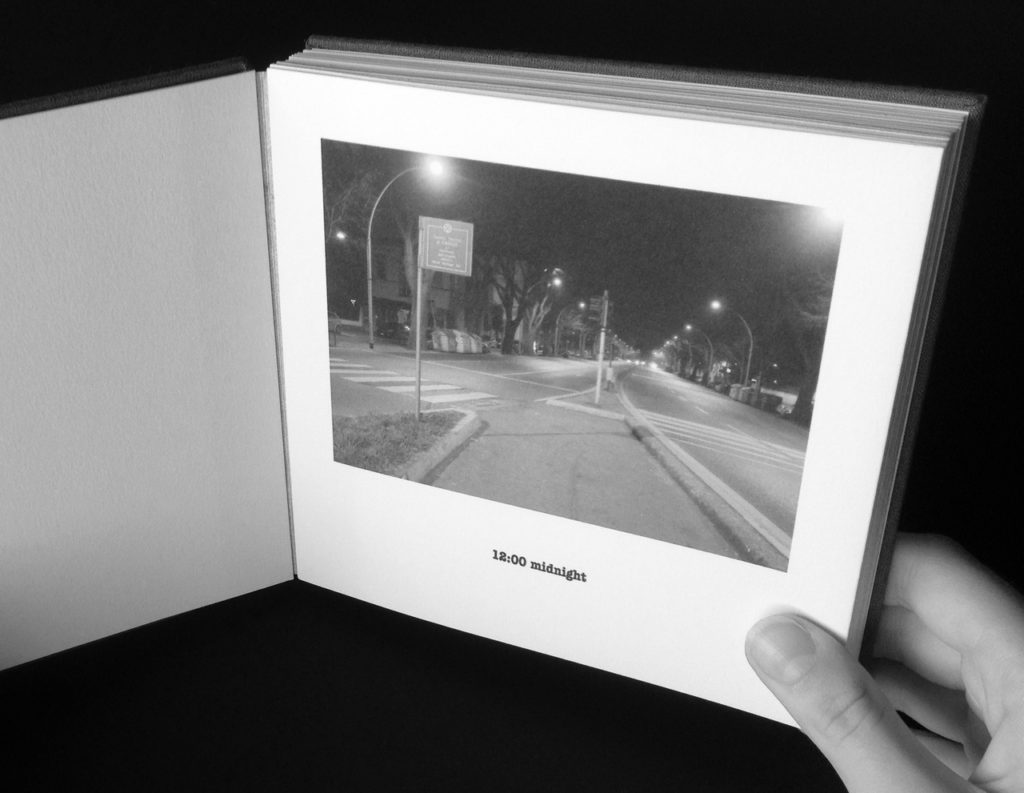
Notes from the Editors
Lyall Harris & Mundy Walsh
Our second issue of The Sigh Press Journal invited writers and artists to respond to a line from Charles Simic’s book, Dime-Store Alchemy; The Art of Joseph Cornell: “Three mismatched shoes at the entrance of a dark alley.” We are pleased to present excellent work that interpreted this theme in surprising ways.
The poetry and short fiction “haunt” the shadows and “atmosphere” suggested by the issue theme while the artwork—a collaborative artist’s book by Junior Year Abroad students and their professor—fittingly keeps time. Our cultural commentary by Michelle Tarnopolsky considers the women wearing the shoes.
Fiction by Erzsébet Gilbert cleverly explores memory in a self-reflexive story that takes Gaston Bachelard’s ideas a step further. It also manages to alight on other aspects of the human condition in passing moments such as, “there are so many people, one cannot know them all, or keep them close.”
We’ve asked our contributors to tell us about a recent encounter that took a turn and was not, in the end, what it seemed. You’ll find what they had to say, along with their bios, at the end of the journal.
Each issue is individually curated and unique. Some issues may feature several works from one category and omit others. Our Winter Journal theme will be based on a photo rather than just text. For this and information on categories and submission details, please visit www.thesighpress.com.
Subscribe to our newsletter, where you’ll receive the latest issues, Ampersand interviews and news:
Contents
*
,
!
–
‘
´
?
*

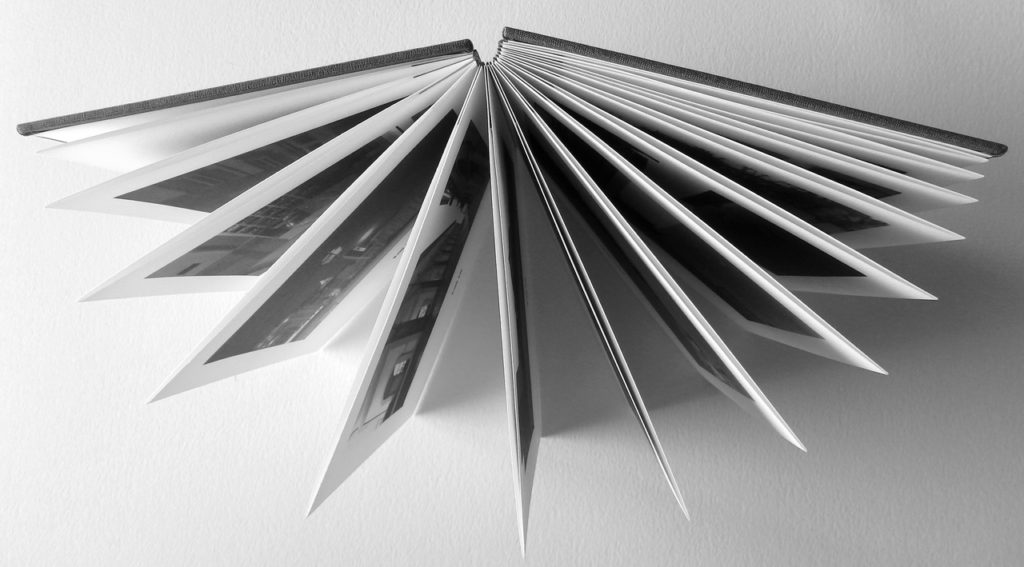
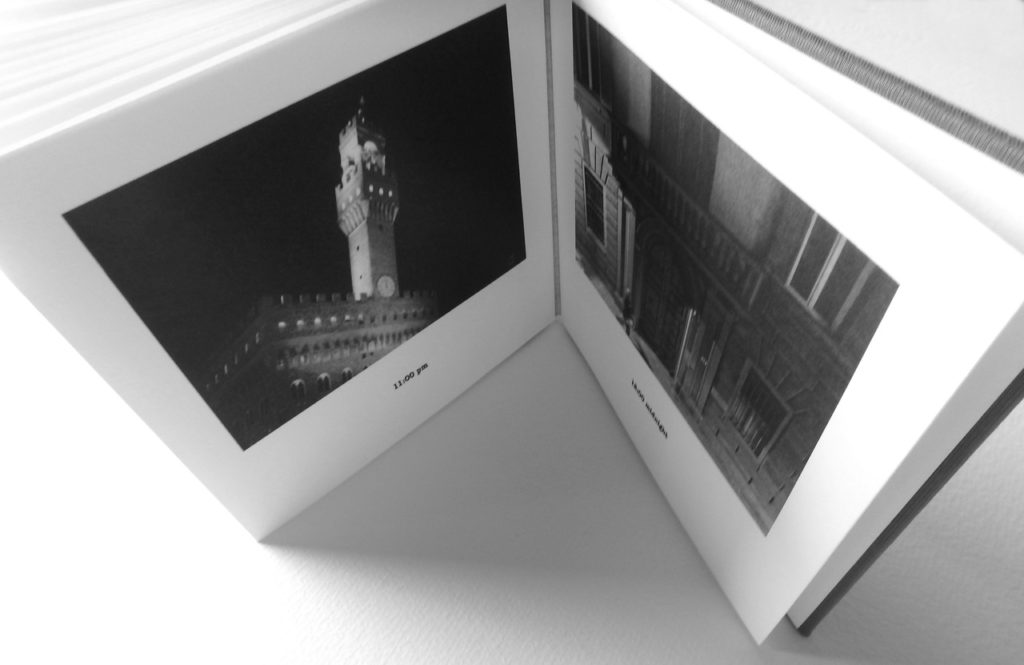
24 HOURS IN FLORENCE EDITION SIZE FIVE • 6 X 6 X 7/8 IN • 15 X 15 X 2.3CM • 25 PAGES
,
DISTURBING THE ATMOSPHERE
KB BALLENTINE
Haunting the shadow of a deep-rooted pin oak,
I listen to distant rumbling, watch ashen skies,
know the light of you is spent.
Earlier, the wingbeats of dragonflies hummed,
summoned bees from cone flower nectar.
Air close, motionless.
Thunder pulses.
Raindrops crater the lake,
ripples blur into ripples
until gray eclipses my kitchen window.
Warm towel scrubs my skin raw.
You shadow the roaring rain,
and I breathe your ghost—a prick, a sting—
a flame unquenched.
*
12:00 MIDNIGHT
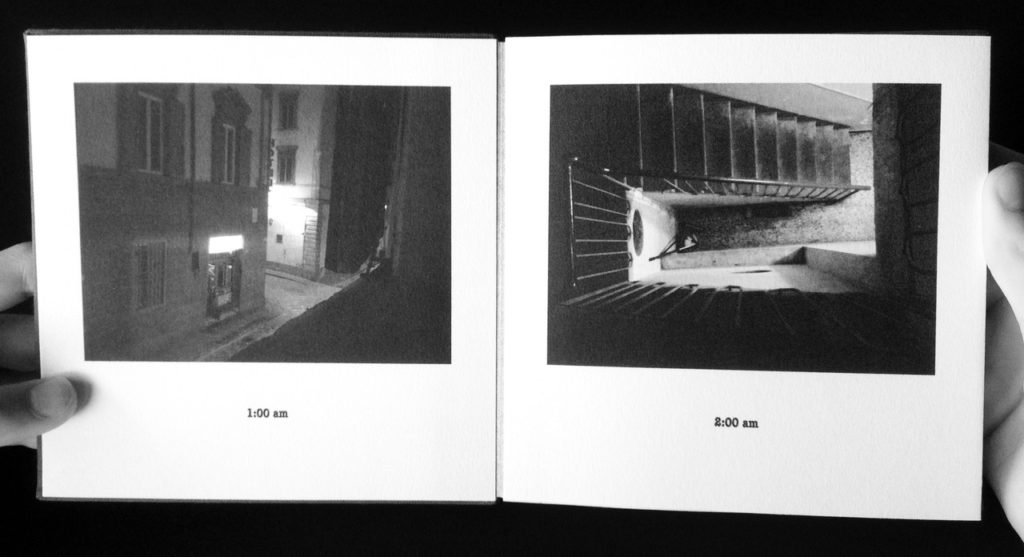
1:00 AM & 2:00 AM
!
ARS MEMORIAE
ERZSÉBET GILBERT
Perhaps—considering it now, while the starlings (I think they are starlings) are shattering themselves against the supposed blank page of a dawntide sky (I think it is dawn)—perhaps it was the graffito in the town square which made me recollect Mr. Hart with such a terrible clarity. I cannot say how long it has been, how many years of banalities and disaster (these I do not remember, only that they were very bad) have passed since last I spoke to Mr. Hart. I consider it now either a curious shortcoming or a successful trick of the mind that having neglected him for so long, I can recall him now with the eerie lucidity of a dead man in the water: I see his repetitive black suits, frayed at the ankles as if he had come to us across a field of thorns, and I see his feet in the sneakers of a child, and his hair like hoarfrost, the eyes whose acuity is muted and mutated by tempestuous, Shakespearean cataracts. Shakespeare, this is a name I believe I know.
I suppose, now, that perhaps it was the very presence of his wisdom that gave Mr. Hart the half-blindness which plagued his steps and his wan, fumbling fingertips; he would ask us for help, leaning upon our arms to reach this tabletop or that shelf whereupon was placed an amphora or a verdant sprig of hemlock. Such items were important to him, though rarely (if at all) did we understand (and there were many of us, though I cannot say where the others have gone). Yet in spite of these disabilities Mr. Hart still spoke with the sort of effortless knowledge which creates terror in naïve students and ghouls in ominous academies. With his voice like the motion of the last ice age, he could look upon a sunflower (there was a sunflower in the vase of blue glass, I recall) and recite the Fibonacci sequence in a cyclical rhythm up to one thousand. Once, he left us shuddering with a hushed and fascinated terror, having interpreted aloud the theme embedded in a certain theatrical manuscript (a meaning I shall not repeat).
But considering it now—and perhaps this is simply called to mind by what I believe is a fortuitous daybreak, the radiance like near-comprehension at the sky’s edge—I do think that I can remember a few lines of that nameless play (the charm dissolves apace, as morning steals upon the night). Here, now, in this square where I have recently glimpsed something I cannot recall, I can see a broken bottle beside a heavenly fountain whose waters do not flow. The marble angel’s name is Raphael, I think, a name which glows. There is a lost hat upon the park bench next to me; it has a scarlet blossom on its brim.
Once (I do not remember the setting, though I believe there were scarlet drapes, the drapes must have been scarlet, I am sure), we all came together to debate the various notions of memory which have seduced and stricken our human condition for more years than are counted upon an infinitely divisible hand. It was then, I recall, that Mr. Hart arrived to offer up his learning once again. The ancients, he told us, practiced their own intricate modes of memoriam.
Long ago, he said, a wandering philosopher or a rhetorician or a plebian desperate to know the nature of virtues and fauns might build a memory palace. Such structures, he explained, existed only in the abstract territories of the mind, but in their convoluted corridors and chambers of walking ottomans and unicorn tapestries, one might contain all memory in architectonic form. Each balustrade and each object of the memory palace represented and therefore perpetuated a correlated memory, so that a strand of pearls was the correct route to take to the sea, and a quill pen was the image of one’s best friend at the age of six, and a needle and thread contained the method by which to calculate the hypotenuse of a nonexistent triangle.
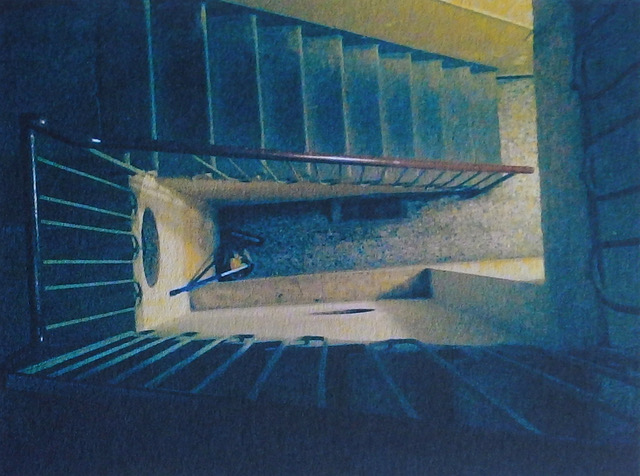
The others (I cannot think of who was there, now, but we were legion) began to talk of this idea in a most tedious way, with the bastardized wisdom seen so often in the pseudo-mystic literature which lends some people hope, and brings to me a kind of nausea. But Mr. Hart went on, and I listened as always I did. I caught the scent of beeswax, like the extinguishment of a birthday party for a child I do not know (but there were always smells there).
The palaces of memory, Mr. Hart told me, were indeed a feat of a marvelous ingenuity seldom cultivated anymore, but in his opinion they never did realize the vast potential given to our thoughts. Out of memory, Mr. Hart maintained (often he was lost in contemplations such as this), one might construct not merely a manor but an entire city devoted to information, in which every tower and tenement contains an elaborate meaning for its mortar, and this might even expand into an entire countryside—no, oceans—no, indeed a world of recollection.
Each willow and garnet and slumbering animal would be not itself but the symbol of a something else one wanted to recall, Mr. Hart mused. He seemed to quiver, and his cirrostratus eyes saw something I could not. Even the people of such a world, he said, would themselves be but the arbitrary and efficient signs of some other memory.
I do not know if Mr. Hart intended for me to understand. He gave me a pewter teaspoon, which still I keep. In my hand it feels not unlike the wingbone of some monstrous, scavenging beast (I think that I have neither seen nor held a condor, but so I am somehow able to imagine this airborne weight). Considering this morning, I am not longer certain that the birds crying their cantos above me are starlings at all; perhaps they are swallows instead.
This teaspoon, which I have never used, at once calls to mind the lovefeasts of the ravenous, rhapsodic past. I have heard tell of a banquet held in a city (which I do not believe I have visited) whose name is Firenze, reminding me of sprays of flowerets. This was the love-feast, the celebrated gathering in which nobles, artists, poets of iambic elegance all came together to partake of pomegranates and white apples and wine contaminated with gold-dust. It was five hundred years ago, upon November the seventh, though this is only important if one wants to imagine the growing winter tracing its lace upon the windowpane (I do not remember my last wintertime). The luxuriant event was directed by a man whom I have never met, one Marcilio Ficino, who wrote that human love is the reaction of the soul to the provocation of beauty (and I quote, though I do not know where I learnt this, and now I see that I have scratched my wrist upon a scarlet rosebush I did not notice here before).
The men of the love-feasts met to discuss the nature of love itself, to craft a taxonomy to classify what permutations of emotion humanity had discovered at the time (and as I believe Mr. Hart once mentioned, this was in fact an era in which the palaces of memory resurged among the velvet intelligentsia). There exists, I have noticed, a kind of elegant compulsion which seeks to catalogue all things, as if one might somehow find a pattern most supreme, with which everything is brought into the museum of our knowledge.
Of all things, the guests sought most fervently to apprehend the notion of agape, the universal and unconditional love which wills only goodness and demands nothing in return for its devotion. I suppose, now, they wanted to recognize it in themselves, between themselves, shining upon them from what once was known as heaven—this feeling which surely bordered upon sublimity. I do not know if truly they achieved this, or indeed what real agape would feel like behind the breastbone.
Of course (how is it that I know this) these men knew too the other faces of love as it smiles or weeps. These included eros, the love which (I can remember a few tales which Mr. Hart described to me, here is my hand, with my heart in’t) I suppose we call romantic, characterized by its passion like bloodstroke, its utter illogic (if I do not hold you, I am not alive; but I am alive, therefore—), its knowledge of the organ and skin.
Ficino himself knew that force all too well, as one may read in his letters to a painfully lovely student (named Giovanni, how has this name come to me now): since I am bound to you by love, he writes to his paramour, I wish you to be mine, but not just by a contract. One thing I have acquired in full measure from the study of sacred philosophy, virtue, and truth: the joyful company of you, the man most dear to me.
It seems to me now that eros must be intrinsically entwined with the sense of longing, a kind of agony both wrenching and winsome. Here, now, in a window open to the sight of this square and its dim stones, a thread frays from the curtains like a bridal veil. Such longing as eros is perhaps a kind of elongation of the aorta, a link too-vehemently felt between one’s heart and that of somebody faraway or perhaps near, but unattainable (I myself cannot determine if I have felt this before). It is somebody we shall never forget.
I do not know how many atria or ventricles my heart possesses, if I have one, for I have never inspected my own anatomy. Sometimes I have longings, myself, but I do not often know their names. O true companion of my voyage, writes Ficino, the sweet reward upon arrival at our destination!
As now I rise, the air smells of patchouli, earthen and warm and pagan (like the inside of an emporium selling amulets and precious stones, where I do not think I have been). Maybe I shall walk through that door which is left ajar, in the building with those fluted pillars crowned by acanthus paralyzed in its bloom. Somehow this seems akin to a headstone, though I have never paced through the mossy laments of a cemetery, myself. Inside the door there is a globe, but spinning it with my finger upon what seems the ultimate meridian, I cannot recognize those outlandish continents and the seas stirred by the winds of the fata morgana. That coastline, there, looks like a woman’s face.
Mr. Hart used to while away much time in remembrance of a woman he had once known. She was like the light of Venus in the east and in the west, he told me, a forever-recurrent and yet inconstant star.
I shall go up the stairs. Though I think I have heard scant strains of music before (a melody here or there, something lilting along the hipbone of a violin, touched by lyrics which rhyme for the sake of a kiss) (I do not know if I have kissed), I cannot identify the laws which govern it. Nonetheless this staircase brings me to think of music, as if it is through the curvature of steps that I shall come to understand the ascending notes of a pentachord.
Mr. Hart’s favorite song was something entitled These Foolish Things (though I myself have not heard it beyond that occasion when he placed a cigarette between his dry lips, fumbling for the matchbox as he hummed the tune). His favorite rendition, he remembered, was that performed by an acquaintance of his named Arabella. Arabella, he told me, possessed that particular grace which belongs to certain people who grow more lambent with age, as if she lived in a sort of symbiosis with the limelight. Her countenance makes me think of the crystal chandelier which now overhangs this stairwell, the arm upraised, arced as a bough of brass and luster (though never have I seen Arabella herself).
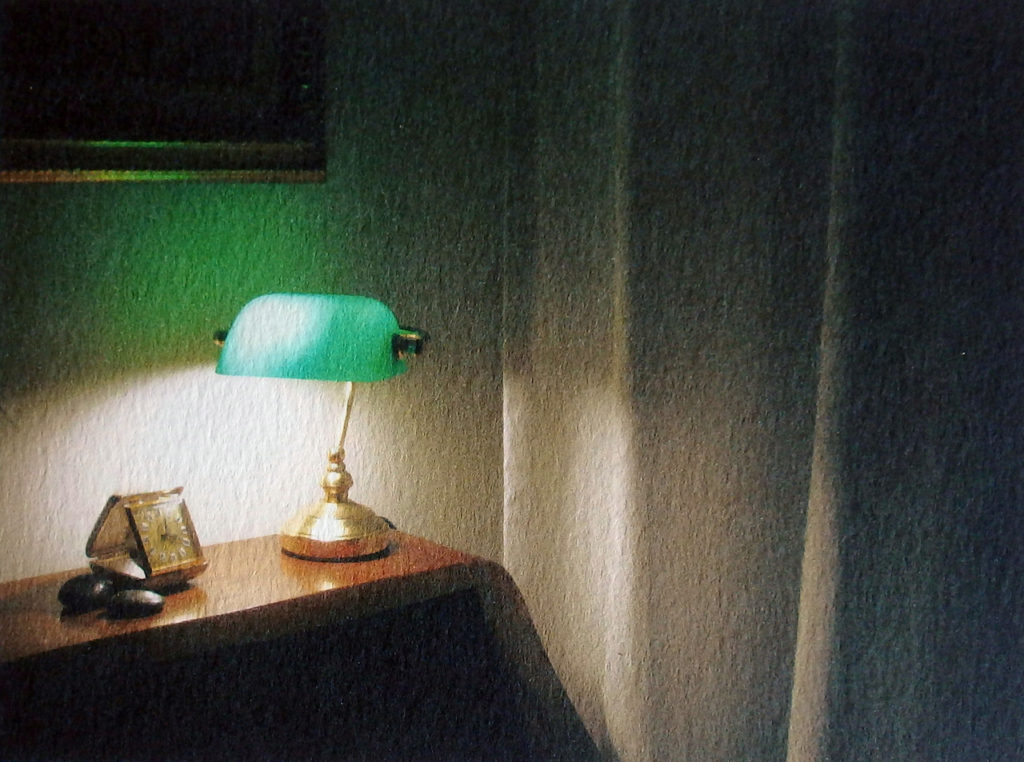
Arabella, so Mr. Hart used to reminisce, watched her own self with the kind of keen acumen which few ever grasp; I am no star, she used to say, only a songbird. But I do love a good love song. Arabella knew she was skilled and yet never to be recorded, and fiercely intelligent but seldom to be believed, lovely and still not gorgeous. It was such awareness, Mr. Hart says, that made her more remarkable than ever she realized.
People (there are so many people, one cannot know them all, or keep them close) typically liked to listen to Arabella only when she stood in the cascade of a scarlet gown upon a stage, but Mr. Hart liked to hearken to her speech, when glazed with the sweat of a performance she would collapse to sit with a single glass of Sangiovese upon a quiet bench. She would toss her ostentatious floral hat aside like a message discarded, and sigh.
She told me of her childhood, Mr. Hart said, an impoverished youth spent laboring to shake olives unto the harvest ground, grinding them to a slop which would be pressed into a miraculous oil sold upon the baked roadsides. My father died when I was very young, she said, which perhaps has influenced me in ways I do not wish to describe (I must have had a father, I think now), and all around us, forever came the screams of the cicadas.
The cicada itself, Arabella told Mr. Hart, is a most notable creature. Its own song is produced by the spasm of abdominal muscles against a bodily drum, and the majority of its life is spent in a state of slumber as a nymph beneath the earth. How many of us, she once asked, devote our own biographies to the act of stasis and a metaphoric sleep in the warm dark? Nobody can say how the cicada knows the precise time to crawl from its secret bed, or whether it can remember its interminable dreams (and for myself I am not certain of how to pinpoint the membrane which divides a dream from the warp and woof of the waking world). When the insects emerge they transform with the abandonment of their own exoskeletons, leaving them to sit as the hollow corpses of dissonant music upon those olive trees. Perhaps, Arabella suggested, this is why the cicada has come to signify both languor and resurrection, though these marvelous creatures are prone to the predation of birds.
In a certain treatise of ancient Greece (that same dead culture which produced Corinthian pillars and the first memory palaces, though I do not know why I keep this fact), Socrates and his student sit amidst the frantic serenades of the cicadas, or so did Mr. Hart once describe it to me. The philosopher discusses the madness of eros, a phrenzy generated by the excruciating sight of one’s love (eventually he shall be forced to drink the ambrosial poison of hemlock as punishment for his thoughts, what led me to recollect this).
I let my hand come to rest upon shelf in this dim hall, whose ending I have not yet contemplated. A candle rests upon the shelf, conspicuous with its ruinous drips of wax and the fact that it is not lit. There is a scratch sketched as a blood signature upon my wrist. I did not know that I could bleed, nor can I remember what wounded me, what was it. It was something which was scarlet and smelled so exquisite, this much I recall.
Mr. Hart’s own childhood, as he once told me, was punctuated by candles at the unfurling of each metamorphic year. O! how the spring of love resembleth the uncertain glory of an April day (this verse he once recited to me, though I cannot recollect the bard’s name). I always had a birthday cake, Mr. Hart said, and though chocolate was forever my favorite flavor, I began to detect an increasing sorrow in the dousing of those flames by my own breath, for it is said to be impossible to remember every tragicomedy and every moment of the seasons which have passed, and the passage of time represents both an accumulation of memory and an ever-mounting amnesia.
I myself cannot just now recollect my childhood, though I envision storybooks and a blanket fortress built with another child to share its magic ward. But I do not believe this is something I in fact experienced. I must have a birthday, whose date just now escapes me (nevertheless, the seventh of November seems important somehow).
I do not remember why I came upstairs. Such a feeling is maddening to me, but there must surely be something I shall recognize soon. I will go into this room, now, which is more luminous than the corridor. I see that I am only wearing one shoe. There is a clock upon the wall, which I believe is not functioning as it should, for its fingers point towards noon or maybe midnight, and yet I believe that vague splendor beyond the windows (open windows, a curtain unraveling) must surely be the coming dawn.
Some of the first clocks known to humanity with all its obsessive chronometry, as I remember Mr. Hart said, were the water clocks which reckoned the birth and death of instants by a precisely measured quantity of liquid dripping from one vessel to another. In the tongue of ancient Greece such devices were called clepsydras, the water-thieves, which Mr. Hart maintained indicated the ambidextrous ability of time to steal not only water but also all roses, all poetry (no matter the cadence), all luculent insects and all lovers, too. All cities, he mused. Or perhaps not every city. He asked me, once, whether it might be possible for a memory to be conscious of time’s passing, if a memory itself can remember (let alone, he mused, if a memory can love), but he did not expect an answer (and I had none).
Water, he told me, was responsible also for the inception of the Greek goddess of love, Aphrodite, born when her father’s organs were tossed into the churning sea. She is also called Venus, he explained, the name given to the second planet from our sun, appearing at each daybreak and dusk. Her child’s name is Eros.
A certain image appears oddly lucid to me now: that of a man (who is surely too young to be Mr. Hart) upon a seashore idyll; he is toying with a shell the color of flushed lips, and touches the thigh of a woman sitting by his side. She turns her face from me, but if I examine my own palms I am certain I could say she sparkles in the sun. I do not know why I think of this.
There is a song in my head (O how the ghost of you clings), but there comes a noise, too, a chorus without coordination. Something is making birdsong outside. Maybe they are starlings, I cannot say, though I have heard from somebody (who) that the nightingale possesses the sweetest cry of all. There is a book lying upon the floor beneath the window.
Mr. Hart’s best friend (since the age of six, over so many years of willow twigs and the cataclysm of growing up, and also tiny fires, for a reason I cannot recall) himself was a writer of small renown. He was called Gabriel (who in the myth of piety is one of the thousand-winged archangels, along with Raphael; how do I know these names), and in his rather brief career he authored two volumes of poetry and three novels which were published to indifferent reception. But, Mr. Hart has always felt, Gabriel’s apparent failure is perhaps only the product of the peculiar relationship he bore to written language. He would agonize over the position and the subterranean definition of each word, scattering his books with so many items of grandiloquence that one lost track of the plotline while absorbed in the description of, say, a pomegranate or a frail feather.
But this, Gabriel told Mr. Hart, is because I am of the firm opinion that every object within this animate world holds within it a profound, if encrypted, significance. Everything refers to something else; perhaps even you and I are no more than the flickering signs of something never to return. So it is with the text—and writing, Gabriel said, is in itself a dialogue with recollection. If only we could read the world around us as the book now resting in your hands, we might discover a coherent (or perhaps not) arrangement of object-as-word-asobject, metaphor-as-human and beast-as-phrase, the order of a grand chronicle.
Whether this would amount to a memorandum or an epitaph Gabriel could not say. Mr. Hart told me that his friend had once spoken of composing an omniscient encyclopedia of the mnemonic, encompassing in its characters all possible memories (if rearranged). This, however, could not be completed before the day Gabriel drowned in an unanticipated riptide; his body, rendered the color of apple-flesh, washed ashore amid the multifarious and sinister flotsam characteristic of some regions of the sea: kelp bulbs and heartless jellyfish, garbage, driftwood bones, an incidental pocketwatch tangled in a weed. It occurs to me that I do not know whether Gabriel intended to perish or to endure, and likewise none of us may know his final thoughts.
Mr. Hart told me that he had at one time memorized a love poem of his friend, in order to recite it to somebody (whom I did not know) when he gave her a bundle of roses. He did not repeat it for me, though he did inform me that love itself possesses a plenitude of names, whether we remember them or not. I have wondered, at times, whether it is given me to fathom love, or if perhaps there exists yet another species of it which, though possibly available to me, remains unidentified.
I lift the book, and it leaves the mundane silhouette of itself amid the dust (and ashes, are those ashes) upon the floor. Whether it is light or heavy I cannot decide, though I recognize that scent of vanillin and insidious worms. I know how to read, of this I am sure; nonetheless when I open its pages (its pinions, Mr. Hart once recalled, that was something Gabriel said), I can only discern certain words—agape, that is one of them, though I have forgotten what it means—and when I move to yet another word I have forgotten what it was I read before. Maybe this a paper-cut (when, when did it happen) there across the twilit veins of my wrist.
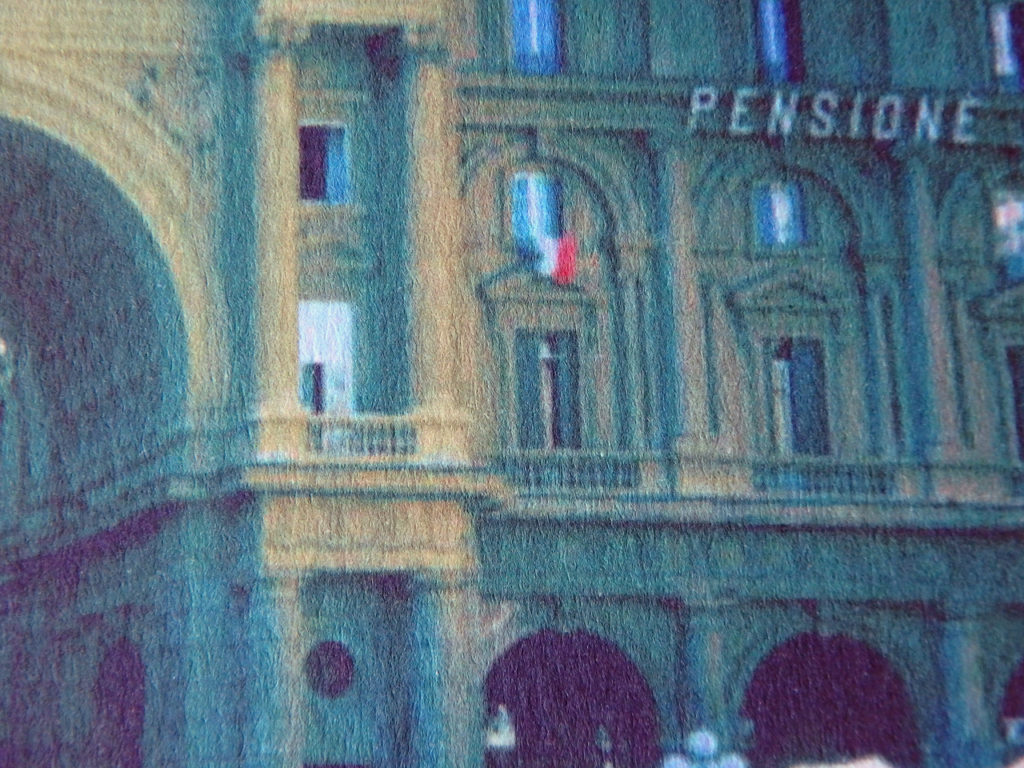
I will go to the window now. Past those aery curtains (a ghost clinging to the arm, how it clings), I can see a square, nondescript and shining, with a small flowering bush and a park bench where maybe somebody might sit. An entire city lies before me, an array of apartments and spires, the treacherous realm of the rooftops and streets cutting between (perhaps brutally); there are so many structures, whose inner chambers and secret electricity I shall not know, though I know there are mechanisms in the walls. I cannot glimpse the horizon, only the idea of it, by way of the wan luminosity that may be either rising or descending far beyond; it occurs to me that I do not know how to distinguish the dawn from the dusk. That needle of light may be either the morning or the evening star, and whether I ought to call it Venus seems debatable.
Under the gaze of something meant to commemorate the goddess of love, I can discern many things (these foolish things) which I had not noticed before. There is a piano in the middle of a skewed lane, though I do not believe it shall ever be played; there are illegible papers of ambiguous news drifting over the sidewalks, and a typewriter sitting speechless upon a doorstep (it is not given me to write anything down). Upon the windowsill I now find bright and brittle and terrifying shells, as if some tiny creature had here died, or perhaps become something else entirely (which is the same thing). There is an incidental, iridescent, incongruous angelfish, down there upon the ground (the opposite of drowning), and a tin can, and there are three mismatched shoes at the entrance of a dark alley, two glasses of wine, and an open cage. There is something which may be a pomegranate, or a maybe piece of the body excised.
It occurs to me now that each of these objects may be in fact important, a cipher alluding to something I cannot recall. This has been suggested before, I believe, by a poet with whom I was not familiar and do not expect to read. There are many birds, shrilling and chiming not-words in against the sky; they may be starlings, though from here they appear as asterisks. Yes, I remember—it was a graffito, a faded drawing in the shape of a heart, which led me to recollect a man (his name escapes me) whom I think I knew long ago.
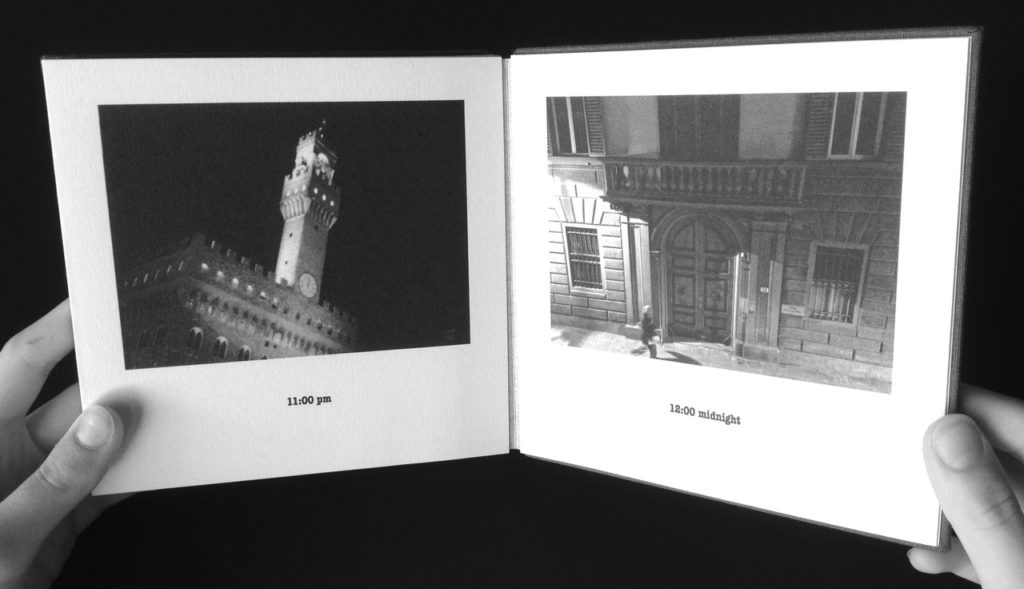
11:00 PM & 12:00 MIDNIGHT photo
–
OMBRA
Not again.
You follow me home,
lurk at the gate, tall as a stand
of cypress trees,
silent as the well-shaft.
You circle my wineglass,
a gritty sediment
swallowed before I know it.
Close my eye, you’ll slip
inside the lid,
cold as the moon,
skating on the surface
night after night.
‘
SMALL MYSTERIES

It was late dusk, thick with the smell of ozone, when she tripped over the curb. She looked down to see she had stumbled over a memorial wreath of real poppies. In August? Next to it, one brand-new toe shoe, the ribbon spattered with dark spots, and a jeweler’s loupe with a cracked lens.
How had those items come to be discarded in the same place? With a flash of lightning and a crack of thunder, the deluge began. She popped her umbrella and hurried home.
AN UPHILL BATTLE, IN HEELS
MICHELLE TARNOPOLSKY
At a party I attended a couple years ago, after a woman said she was feeling a bit drunk, a man nudged her male companion: “Looks like someone’s getting lucky tonight.” Though loud enough for everyone to hear, his “joke” passed without comment. When I called the man out on it later, he said I just didn’t get Tuscan humour.
Tuscans seem to think their Amici-Miei-style offensive humour is harmless. This man was deeply offended I could even suggest he was promoting rape culture. And why would he think that? Italian men can have their way with their wives with near impunity. Until 33 years ago they could murder them and get away with it.
Signs of change remain marginal. Elina Chauvit’s traveling Zapatos Rojos protest installation did seem to strike a particular chord in Italy. But we need Italian men to start leading, teaching other men how to stop feeling so entitled and start actively practicing empathy. I think a far more effective campaign here would involve Italian men “Walking a Mile In Her Shoes.” Unfortunately, opening their eyes to the ways we all perpetuate the routine objectification, harassment, exploitation and abuse of women remains an uphill battle. I should know. The man at that party was my husband.

5:00AM & 6:00AM
?
Cat got your tongue?
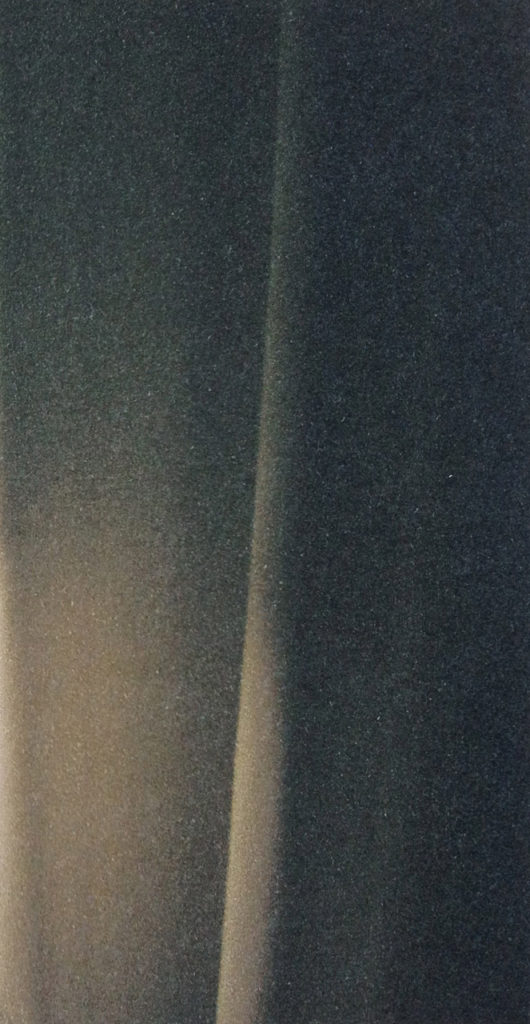
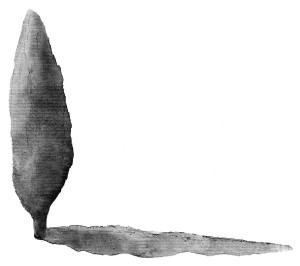
ISSUE 13 • SUMMER 2017 will be published in June.
Visit www.thesighpress.com for details.
© 2017 THE SIGH PRESS
None of the work published by The Sigh Press may be copied
for purposes other than reviews without the author and artist’s written permission.
